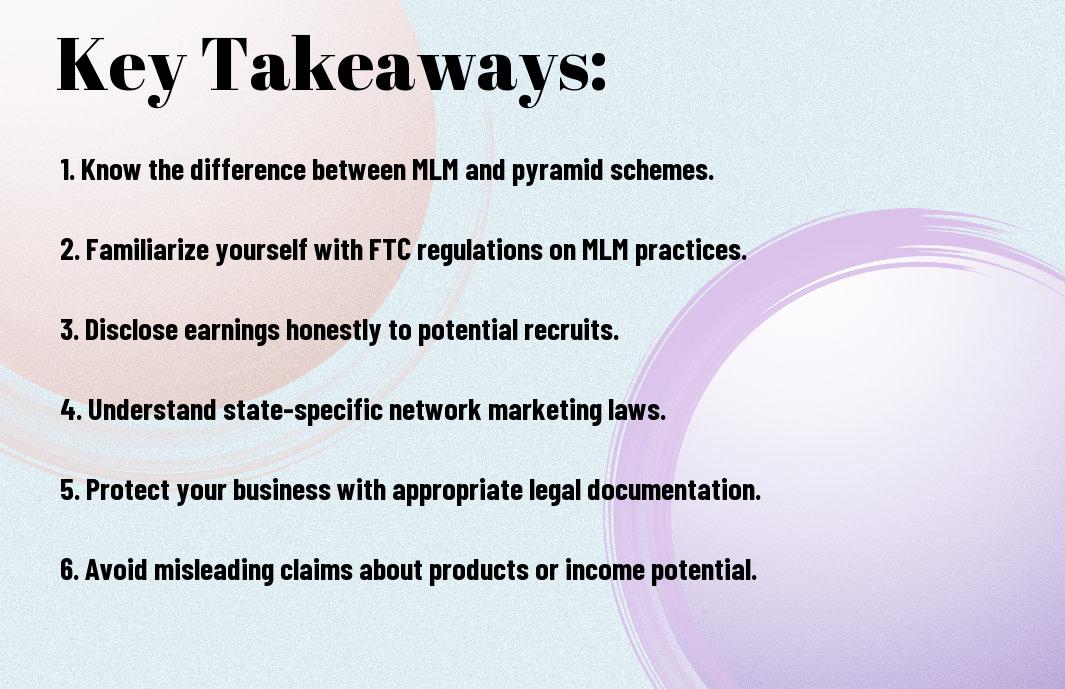With the rise of network marketing, you may be tempted by the lucrative opportunities it presents. However, navigating its complex legal landscape is vital to protect your financial interests. This guide will help you identify potential pitfalls such as pyramid schemes and understand the regulatory guidelines governing your participation. You’ll learn how to ensure your business practices are compliant while maximizing your earnings potential. Equip yourself with the knowledge you need to thrive in this dynamic sector.
Key Takeaways:
- Compliance: Ensure that your network marketing practices adhere to federal and state regulations to avoid legal issues.
- Contractual Obligations: Understand the terms of agreements and contracts to ensure clarity in relationships with your upline, downline, and customers.
- Business Structure: Choose an appropriate business entity that aligns with your network marketing goals, which can impact liability and taxation.
Legal Framework of Network Marketing
For individuals considering entering the network marketing industry, it’s important to comprehend the legal framework that governs this business model. Understanding these regulations not only helps protect your interests but also ensures compliance with the law, allowing you to operate your business effectively and ethically.
Definition and Overview
Above all, network marketing is a business strategy that relies on a network of independent distributors to grow a company’s customer base. This structure allows you to earn commissions not only from your sales but also from the sales made by your recruits. It’s important to distinguish between legitimate network marketing and illegal pyramid schemes, which can lead to significant legal repercussions.
Federal Regulations
Beside knowing the structure of network marketing, you should be aware of the federal regulations influencing this industry. The Federal Trade Commission (FTC) plays a significant role in overseeing network marketing practices, ensuring that companies do not engage in deceptive or misleading business practices that may unfairly target consumers or mislead potential business partners.
To ensure compliance with federal regulations, you must familiarize yourself with the FTC guidelines that pertain to advertising, recruitment practices, and earnings claims. These regulations require you to be transparent about what you can potentially earn and to provide clear communication regarding the investment involved in starting the business. Failure to adhere to these legal standards may subject you to penalties, including fines or even criminal charges, while compliance can protect your business and enhance your credibility in a competitive market.

Pyramid Schemes vs. Legitimate Network Marketing
While both pyramid schemes and legitimate network marketing involve recruiting individuals, the fundamental difference lies in how business profits are generated. In legitimate network marketing, participants earn income based on the sale of actual products and services, whereas pyramid schemes focus primarily on recruitment, often at the expense of actual sales. Understanding this distinction is vital to ensuring you engage in a legal and ethical business model.
Identifying Pyramid Schemes
Pyramid schemes typically promise high returns with little effort involved. If a business prioritizes recruitment over the sale of genuine products or services, and requires you to invest a significant amount upfront, it is likely a pyramid scheme. Look for signs such as the absence of tangible products and a strong emphasis on enrolling new members, as these often indicate a deceptive business model.
Legal Consequences of Pyramid Schemes
By engaging in a pyramid scheme, you risk facing severe legal consequences, including fines and potential imprisonment. The Federal Trade Commission (FTC) actively investigates and prosecutes pyramid schemes, leading to business closures and restitution to defrauded members. Ensuring you steer clear of these illegal structures protects not only your finances but also your reputation.
Legitimate network marketing allows you to thrive while adhering to the law, unlike pyramid schemes that can bring grave repercussions. Participating in a pyramid scheme may expose you to significant financial losses, as your investment might not yield any returns. Additionally, you could face legal action from regulatory bodies like the FTC, which can impose heavy fines and possibly jail time. To safeguard your investments and career, it is important to thoroughly vet business opportunities and focus on those that emphasize ethical sales practices and product-driven revenue.
Compliance and Ethical Practices
Not adhering to compliance and ethical practices can jeopardize your network marketing business. It’s imperative to understand that state and federal laws dictate how you operate. Ensuring that you follow these regulations not only protects you from legal repercussions but also builds trust with your customers and your team. By prioritizing ethical standards, you contribute positively to the industry as a whole.
Disclosure Requirements
Among the various legal aspects of network marketing, disclosure requirements stand out as integral. You must clearly communicate potential earnings, risks, and the overall compensation structure to your recruits. Transparency is not just a best practice; it’s a legal obligation in many jurisdictions. Ensuring that you provide this information helps manage expectations and fosters credibility in your business.
Marketing and Advertising Laws
On your journey through network marketing, understanding marketing and advertising laws is vital. These regulations govern how you promote your products and earnings potential. Misleading claims or exaggerated promises not only undermine your reputation but can also lead to legal actions against you and your business.
Advertising in network marketing requires a careful approach to ensure you remain compliant with federal and state laws. You need to present factual information about your products without making unsubstantiated claims about potential earnings. Adhering to guidelines set forth by the Federal Trade Commission (FTC) can protect you from penalties and maintain the integrity of your business. Focus on honesty and transparency in your marketing endeavors, and always provide potential customers with realistic expectations regarding what they can achieve with your offered products or services. By doing so, you not only comply with the law but also cultivate long-lasting relationships built on trust and reliability.
State-Specific Laws and Regulations
Keep in mind that network marketing is governed by a myriad of state-specific laws and regulations that vary significantly across different regions. Understanding these laws is imperative for ensuring compliance and avoiding legal issues that could arise from operating in a particular jurisdiction. Each state may have its own set of rules regarding compensation plans, product claims, and business practices, so taking the time to familiarize yourself with these regulations is vital for your success.
Variability Across States
StateSpecific regulations can differ widely, affecting everything from registration requirements to how income disclosure statements are presented to potential recruits. Some states may impose stricter guidelines than others, making it imperative for you to research the specific landscape where you plan to operate. Staying informed about these differences can save you from potential pitfalls and ensure that your network marketing venture remains on solid legal ground.
Importance of Local Compliance
Variability in state regulations highlights the importance of local compliance. Operating without adhering to these laws can expose you to significant risks, including hefty fines and disruptions to your business. Each state has unique rules that align with its consumer protection policies, and being well-versed in these can help you maintain your reputation. Not only does compliance safeguard your interests, but it also reflects a commitment to ethical practices within your network marketing efforts.
At the end of the day, adherence to local laws provides you with a shield against legal repercussions that could threaten your business’s longevity. Failing to comply can lead to severe penalties, including financial liabilities and potential criminal charges in the most serious cases. On the other hand, taking the steps to understand and meet your local compliance obligations demonstrates your professionalism and can enhance your credibility with both your team and potential customers. Make sure you proactively align your operations with applicable state laws to foster a secure and lasting network marketing experience.

Protecting Yourself as a Network Marketer
Despite the appealing nature of network marketing, it is important to protect yourself from potential legal issues. Familiarize yourself with the distinctions between legitimate Multi-Level Marketing Businesses and Pyramid Schemes. Understanding these differences can help safeguard your investment and reputation.
Contracts and Agreements
An important step in network marketing is having clear contracts and agreements. Ensure that you carefully read and understand all terms before signing any document. This accountability will help establish a strong foundation for your business activities.
Understanding Your Rights
At the core of your network marketing journey, knowing and asserting your rights as a participant is paramount. Your rights include having access to truthful information about the company, its products, and the opportunity being offered. Additionally, you are entitled to an equitable commission structure and the right to withdraw from the business without facing undue penalties.
Considering your rights, it is important to be aware of the potential risks associated with network marketing. You need to understand that you cannot be forced into a contract or misled about the income potential. If you ever feel uncomfortable or pressured, it’s time to reevaluate your position. Always make informed decisions and seek legal advice if necessary to protect your interests.

Common Legal Mistakes to Avoid
Your success in network marketing greatly depends on understanding the legal landscape. By steering clear of common legal pitfalls, you can protect your business and ensure its longevity. Be vigilant about adhering to regulations and transparent in your practices to shield yourself from potential legal issues.
Misrepresentation of Earnings
Between exaggerating your earnings and promising potential recruits the same, misrepresentation can lead to serious legal consequences. Misleading individuals about earning potentials not only undermines trust but can also result in lawsuits and penalties from regulatory bodies. Always provide accurate information about income possibilities.
Non-Compliance with Legal Standards
On failing to comply with legal standards, you could face unwanted scrutiny or penalties. Understanding relevant regulations is important for maintaining a legitimate network marketing business.
Standards regarding legal compliance vary by region, but they generally include accurate representation of products, transparent business practices, and adherence to advertising laws. Ensuring compliance protects your business from legal action and promotes a positive reputation. Ignoring these standards can lead to fines, loss of business licenses, or worse. It’s vital to familiarize yourself with your local laws and maintain rigorous ethical practices to secure your operations and build trust with your clients and partners.
Conclusion
From above, it’s clear that understanding the legalities of network marketing is vital for your success in the industry. By familiarizing yourself with the relevant laws and regulations, you can navigate potential pitfalls and operate your business responsibly. Ensuring transparency and legality not only protects you but also builds trust with your customers and team members. Being informed empowers you to make strategic decisions that align with both your business goals and compliance requirements.
FAQ
Q: What is network marketing and how does it work?
A: Network marketing, also known as multi-level marketing (MLM), is a business model where individuals sell products or services directly to consumers and earn commissions based on their sales. Participants in this model can also recruit others to join the business, creating a downline network. This structure allows participants to earn income both from their personal sales and from the sales made by their recruits.
Q: Are there specific legal regulations governing network marketing?
A: Yes, network marketing is subject to various legal regulations depending on the country and region. In the U.S., it must comply with Federal Trade Commission (FTC) guidelines that prohibit deceptive practices and require transparency regarding earnings. Additionally, states may have their own laws that govern MLM practices, requiring companies to adhere to specific disclosure requirements.
Q: What should I look for in a legitimate network marketing opportunity?
A: When evaluating a network marketing opportunity, it is necessary to consider several factors. Look for a company with a proven track record, quality products or services, and transparent compensation structures. Ensure that the company provides clear and accessible information about its operations, earnings, and product performance. It’s also wise to check if the company has any complaints or legal issues associated with its business practices.
Q: How can I protect myself legally when participating in network marketing?
A: To protect yourself legally in network marketing, it is important to educate yourself about the business model and the specific laws governing it. Read the company’s policies and procedures, and be wary of any claims that seem too good to be true. Keep thorough records of your sales, commissions, and any communication with the company. Consulting with a legal professional experienced in network marketing can also provide valuable guidance.
Q: What are the common legal issues faced by network marketers?
A: Network marketers can encounter various legal issues, including misrepresentation of earnings, pyramid scheme allegations, or lack of compliance with direct selling regulations. Other issues may involve disputes over contracts or territories and mismanagement of personal data. Understanding the legal framework and maintaining ethical business practices are important to mitigate these risks and promote a sustainable venture.


